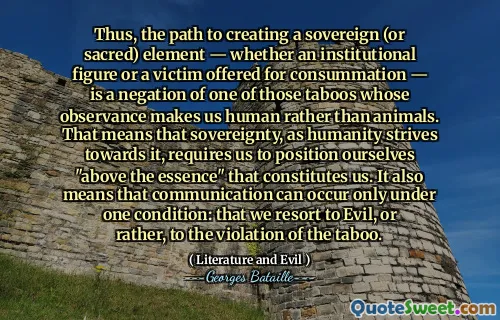
Thus, the path to creating a sovereign (or sacred) element — whether an institutional figure or a victim offered for consummation — is a negation of one of those taboos whose observance makes us human rather than animals. That means that sovereignty, as humanity strives towards it, requires us to position ourselves "above the essence" that constitutes us. It also means that communication can occur only under one condition: that we resort to Evil, or rather, to the violation of the taboo.
This quote explores the complex relationship between sovereignty, humanity, and the boundaries that delineate our moral and existential identity. At its core, it suggests that the creation of what is considered sacred or sovereign involves challenging fundamental taboos—these are the moral 'interdits' that distinguish humans from animals. Normally, these taboos serve to maintain social cohesion and moral boundaries. However, in the pursuit of sovereignty or a heightened sense of human essence, there is an implication that exceeding or violating these taboos is necessary. The notion of positioning ourselves "above the essence" indicates a desire to transcend innate human limitations, to reach a state that arguably resembles divinity or superior authority. Intriguingly, the quote asserts that communication—the finite means through which humans connect and understand each other—depends fundamentally on the violation of taboo or resorting to Evil. This provocative assertion suggests that genuine exchange, truth, or revelation may only emerge from conflict, transgression, or breaking societal norms. Such ideas challenge conventional moral views, hinting that progress, authentic connection, or even the divine may not be achievable within strict adherence to established morals. Rather, they might necessitate moments of chaos or evil as catalysts. This perspective resonates with philosophies that see chaos and destruction not solely as negative forces but as necessary for transformation and understanding. It invites reflection on the limits of morality, the nature of power, and the dark side of human pursuit of transcendence, highlighting the paradoxical relationship between order, chaos, and the pursuit of higher meaning.






